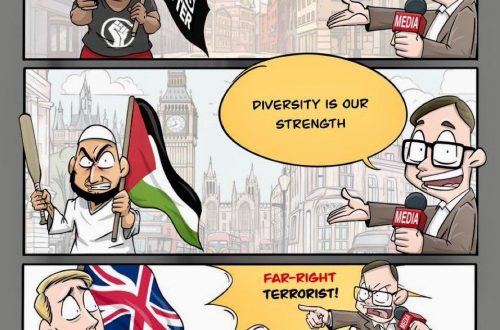This is a cross-post from CEMB Forum
Pharbin Malik was sixteen years old when she died on a street in Birmingham, England, in 1989. She was killed by her father because she did not follow his religion anymore.
We could find no photograph of her anywhere online, or in newspaper archives.
It seems the world has forgotten her. And yet, her story reaches forward in time to touch raw and exposed nerves today.
Like there is no picture we can associate with her, so it is that we who leave Islam are somehow faceless, erased from history and kept hidden away.
The absence of her picture, and the silence accompanying her death, reflect the experiences of many of us who choose to leave Islam, and for that choice are forced to live in fear and silence.
We only have the bare details of her story. We want to know more. We want to know her dreams, her hopes, what she held in her imagination. We would love to know what she loved to do, who her friends were, what made her laugh. What was her favourite song? Did she dream of travelling the world? Perhaps her favourite subject at school was English literature or Art or History. Did she ever watch birds sitting on the window sill and imagine what it would be like to fly away?
There is very little detail available online about what happened to her. The Associated Press covered the story after the trial concluded:
AP , Associated Press Jul. 4, 1989 5:58 PM ET BIRMINGHAM, ENGLAND BIRMINGHAM, England (AP)A devout Moslem who cut his daughter’s throat because she decided to become a Jehovah’s Witness was convicted of murder Tuesday and sentenced to life in prison.
A jury at Birmingham Crown Court found Abdul Malik, 56, guilty of murdering his 16-year-old daughter, Pharbin, last November in front of her mother and two younger sisters.
Malik, who came to Britain from Bangladesh in 1952, had pleaded innocent to murder. Defense lawyer Michael Wolkind, seeking a manslaughter verdict, claimed Malik was provoked and blinded by his faith.
Prosecutor James Hunt said Malik’s standing in the community, where he was on the committee of his mosque, meant more to him than his daughter’s life. ”What he undoubtedly did was to sacrifice her for his religion,” Hunt declared.
The defendant said in the two-day trial that he intended only to frighten his daughter with the 12-inch kitchen knife, but his mind ”went out of control.”
Pharbin had left the family home because of arguments over the Jehovah’s Witnesses and her Jamaican boyfriend, the jury was told, but returned home the day before her death.
Hazzava Malik, 15, testified that her mother pleaded with Pharbin to recite a Moslem prayer to her father when he brandished the knife, but she refused and told him she would go to more Jehovah’s Witnesses meetings. ”He grabbed her by the hair and pushed her to the floor,” the sister said. ”He pulled her hair back. She had a lot of hair. This exposed her neck and he put the knife to it. He did that calmly. ”
He said he would not let her go to meetings, but she said she would. Then he cut her throat. He did it like he was sawing at the same spot. My mother tried to stop him and got cut.”
Pharbin, her jugular vein severed, managed to stagger into the street. She died on the sidewalk.
Hunt told the jury Malik had threatened several days earlier to kill his daughter unless she returned to Islam.
”It was no sudden decision,” the prosecutor said. ”She refused his demands to acknowledge Allah, so he deliberately killed her as he said he would.”
Is it too much to ask that people from Muslim families be allowed to enjoy the same privileges as their fellow citizens, the privileges of free conscience and secular values?
We believe that the issue of ExMuslims is central to debates about Islam in the modern world, and that it is a problematic omission to discuss conversion to Islam without showing the teachings on apostasy in the major Islamic schools, as well as the lived reality and experiences of how ExMuslims are treated. Evangelism to convert people to Islam whilst the apostasy taboos are suppressed, ignored and denied is not only arrogant and sinister but deeply unethical.
We hope that ex-Muslims can be supported by all those who believe in free conscience and secularism.
Muslims can also face this issue through open discussion and empathy. We do not believe this issue can be hidden or ignored any longer.
There can be no pluralism, liberalism, cosmopolitanism or diversity without the freedom to leave, question and criticise religions.
This is a silence that must be broken.
We know from personal experience the stunted lives and the suppressed conscience that Islam’s apostasy taboos have imposed on so many people. Numerous types of abuse, violence and threats of violence hang over the head of too many people who question and want to leave Islam and be open about it. We think of all those who have had their free conscience snuffed out by this unexamined taboo. We think of those in Britain and elsewhere who have experienced violence because of interlinked notions of collective ‘honour’ being insulted.
Let us remember Pharbin Malik. If only there had been a support system for her when she needed help and solace. Let us remember all victims of apostasy taboos, takfirism, and religious dogmatism.
In fighting for freedom of conscience, we hope to pay tribute to Pharbin’s free spirit. She has not been forgotten. We may not know what she looked like, but we can imagine what she went through. It is not that far from what most ExMuslims go through. No matter who wants her memory erased, we won’t let it happen.
We will never forget Pharbin.

